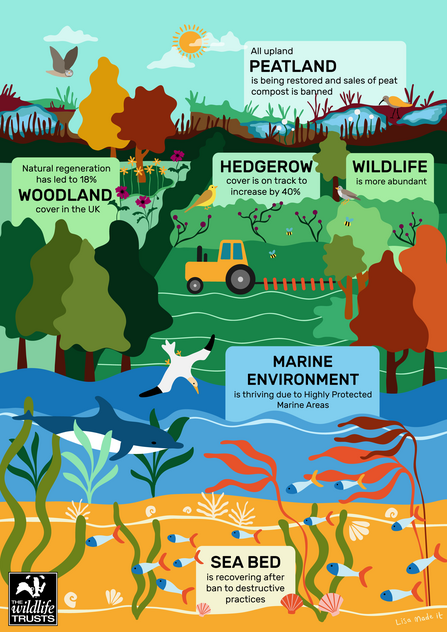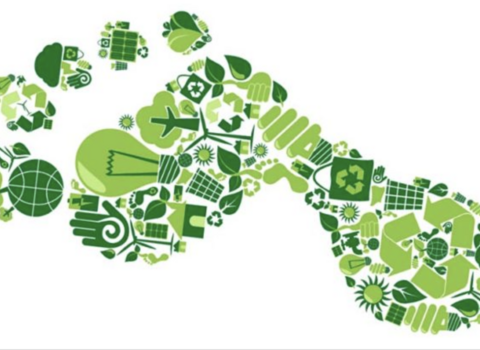What does COP26 mean for Beds, Cambs and Northants?
World leaders have gathered in Glasgow for the 26th COP summit - the spotlight is now on the UK to provide global leadership that raises ambition and turns promises into desperately needed action to tackle the inseparable nature and climate crises.
Here in our three counties climate change is already affecting wildlife. From milder, wetter winters making our nature reserves more difficult to manage for people and nature in spring, to species moving northwards and food availability for young chicks under threat.
But there’s also hope. We’re working on projects to make a difference. At the Great Fen we’re pioneering a new way of farming that locks in carbon for generations to come, and in Bedfordshire our Banking on Butterflies project is trialling new ways to create habitats to help insects survive as our climate changes.
You can support our work to tackle climate change in our region. Click here to donate towards our COP appeal – you can contribute towards our woodland management work and our peat farming work so we can do more to lock in carbon for the future.
The Great Fen and wet farming – a natural solution to our changing climate
What is COP26?
COP stands for 'Conference of the Parties' and these are UN conferences on its different conventions.
COP26 is where world leaders come together to talk about climate change and how to tackle it, as it's the COP for the UN Framework Convention on Climate Change.
This year marks the 26th COP summit - hence why it is called COP26 - taking place 1-12 November 2021 in the UK. It's held here this year because the UK were successful in their bid to host it - this means they have taken on the Presidency. Glasgow was chosen as the location, in part due to the city's commitment to sustainability. The spotlight is now on the UK to provide global leadership that raises ambition and turns promises into desperately needed action to tackle the inseparable nature and climate crises.
Here we look at what we're expecting during the summit, and the leadership needed to ensure that globally we tackle the nature and climate crises.
What do we want to see at COP26?
COP26 is our chance to tackle the climate and nature crises together. Climate change is already contributing to nature's decline, whilst the loss of wildlife and habitats leaves us ill-equipped to reduce emissions and adapt to change. Global leaders must take a stand and embed climate action and nature's recovery across their policies. Broadly, we need:
- A set of national policies from all countries to keep 1.5C within reach
This is critical to protecting the UK's natural environment from irreversible and catastrophic change.
- Leadership
The UK must lead the way at COP26 - and demonstrate the right approach at home. The UK Government is currently not on track to adapt to climate change, or to achieve Net Zero emissions, yet the UK has to play its fair and historic share in tackling climate change that it is responsible for, and supporting developing nations cope with the effects of climate change that they have little historic responsibility for.
- Finance
Agreement that nations will invest in high quality nature-based solutions (e.g. peatland and saltmarsh creation and restoration) that are developed in partnership with local communities to help mitigate against, and adapt to, climate change on a global scale.
What could these commitments look like at home?
So, what does this mean for the UK? All relevant national policies should be contributing to restoring nature, NOT degrading it. This means better protecting what we already have, and expanding it. Government has set a target for 30% of land in recovery for nature by 2030 and Net Zero by 2050 - in order to achieve this, here's what the Government must commit to:
- 30 by 30
Restore a minimum of 30% of UK land and sea for nature by 2030
- Restore 100% of upland peat before 2050
And introduce an immediate ban on rotational burning, to give peat the best chance of surviving in hotter, drier conditions as the climate changes.
- Use the planning system to help address the climate crisis
Introducing a new Wildbelt designation in England would protect land in recovery for nature, and putting Nature Recovery Networks at the heart of the future planning system will address the crisis whilst providing opportunities for people from all backgrounds to access wildlife-rich places in their communities.
- A legally binding State of Nature target to halt and reverse the decline of nature by 2030
This target in England's Environment Bill should be supported by an additional £1 billion per annum investment in nature's recovery.
- UK agriculture significantly contributing to meeting the Government's targets
Government must support and incentivise sustainable land use practices through England's new Environmental Land Management (ELM) schemes.
- Better management of our seas
30% of all Marine Protected Areas designated as Highly Protected Marine Areas, with fishing policies and marine spatial planning contributing to protecting and enhancing blue carbon stores.
Our vision for the future

30 by 30 vision for the future (2030)





